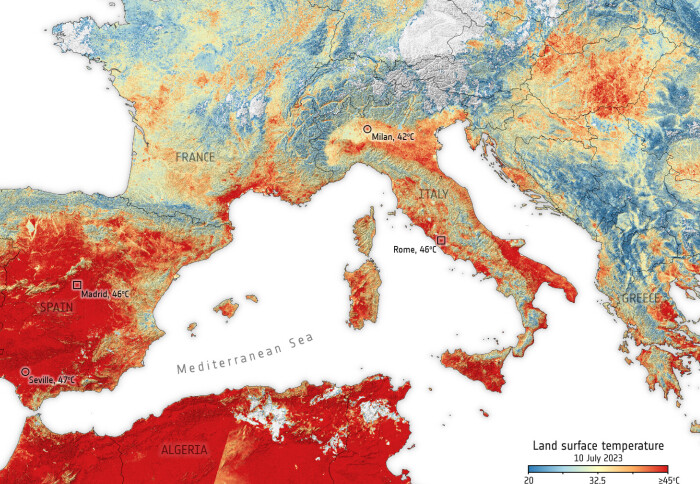Mitigating the climate catastrophe: the role of science in climate policy
by Jacklin Kwan

Credit: ESA/Rosetta/NavCam – CC BY-SA IGO 3.0
A panel discussion with Imperial experts reveals the strengths and limitations of science in steering climate policy.
A panel discussion with experts across the Faculty of Natural Sciences (FoNS) tackled the role of science in shaping effective climate policies, and the increasing necessity of researchers to grapple with subjective value-judgements and scientific uncertainty.
The effects of climate change are already impacting many communities around the world. In 2023 alone, all-high summer temperatures in Europe and the Americas, as well as droughts and wildfires in Spain, Canada and North Africa, were partially driven by climate change.
On top of attributing extreme weather events to climate change, science has also taken prominent roles in steering discussions around net-zero policy pathways as well developing key technologies that help governments achieve their sustainability targets.

Dr Vivien Foster, a Principal Research Fellow in the Centre for Environmental Policy, chaired a discussion about the role of science in climate policy, featuring Professor Colin Cotter (Department of Mathematics), Professor Helen Brindley (Department of Physics) and Professor Joeri Rogelj (Centre for Environmental Policy).
Professor Helen Brindley, based at the Department of Physics, specialises in Earth observation, focusing primarily on the Earth's radiation budget. She explores how Earth's outgoing radiation relates to climate variability and change.
As a director at the UK National Centre for Earth Observation, she specifically monitors energy and water cycles, linking her findings to broader climate studies.
Professor Colin Cotter is a noted figure in the Department of Mathematics, concentrating on computational mathematics. His research employs numerical analysis and scientific computing methods for weather forecasting, ocean modelling and climate simulation.
Additionally, he develops numerical algorithms for probabilistic forecasting and data assimilation – blending mathematical expertise with practical environmental applications.
Professor Joeri Rogelj is based in the Centre for Environmental Policy and also serves as Research Director at the Grantham Institute. His interdisciplinary research explores sustainable societal transformations, integrating earth systems science with policy studies.
Beyond his research, Professor Rogelj actively contributes to global climate discussions, notably as a lead author in UN climate reports and as an advisor on climate science, formerly to the UN Secretary General and currently as a member of the European Scientific Advisory Board on Climate Change.
Establishing observations and future scenarios
Professor Brindley emphasised the significant advancements in observation technologies which enables researchers to make extensive climatic observations.
Primarily, the use of satellite-based observations, which now offer large-scale global coverage at unprecedented resolution, have been instrumental in studying how the emission of greenhouse gases affect climate and are beginning to have the capability to isolate individual emission sources.
Advancements in satellite coverage and resolution, Professor Cotter notes, could also improve climate forecasting models that feed into both local and international policymaking.

Improving data quality and quantity in other fields, such as oceanographic model or even financial carbon markets, can also similarly empower mathematicians to improve the accuracy of various models.
“This kind of research does not only tell us the strategies that we would like to pursue, or the strategies we could pursue, but also allows us to identify strategies that we absolutely would like to avoid,” Professor Cotter said, pointing to how models can help policymakers determine the costs associated with certain actions.
However, Professor Brindley noted that uncertainties remain in understanding the relationship between carbon emissions and temperature changes, and how complex systems like clouds respond to those changes.
Another area of exploration is understanding how pollutants and aerosols affect cloud properties, and subsequently, climate sensitivity.
Bridging science and policymaking
“Science undoubtedly plays a vital role [in climate policy], but I think the whole story of the COVID-19 pandemic illustrates the extent to which the scientific contribution is also constrained,” said Dr Vivienne Foster.
Dr Foster and other panelists acknowledged that science could help predict the impacts of different policy strategies as well as deliver improvements to technologies, such as carbon capture and storage. However, there were questions that science will be unable to answer alone.
When tasked with advising adequate emission reduction targets for the EU, we don't just depend on technologies or economics Professor Joeri Rogelj Centre for Environmental Policy
Professor Rogelj pointed to how many international climate negotiations were constructed in the framework of equity and fairness. “When tasked with advising adequate emission reduction targets for the EU, we don't just depend on technologies or economics,” Professor Rogelj said.
“But it also depends on what could be a fair contribution of the EU to the global mitigation effort and to answer that question as a scientist, we need to first ask society how they understand what is fair," he said.
Inherent in many policy decisions are difficult trade-offs, the panel acknowledged. Countries may have to prioritise achieving specific Sustainable Development Goals, like eradicating poverty, over others.
There can also be high degrees of uncertainty in scientific results, that mean that no easy conclusions can be made about whether passing certain policies will guarantee specific outcomes.
However, scientific consensus around the reality of climate change has led to positive and significant steps forward. “I would say now the evidence is compelling and perhaps that wasn't the case when I started 30 years ago,” Professor Brindley said, “We now need to move away from that discussion to difficult ones about taking action.”
--
‘Mitigating the climate catastrophe’ was a panel discussion held as part of the Natural Sciences Research Showcase, which spotlighted emerging postgraduate research from Departments across FoNS.
Article text (excluding photos or graphics) © Imperial College London.
Photos and graphics subject to third party copyright used with permission or © Imperial College London.
Reporter
Jacklin Kwan
Faculty of Natural Sciences